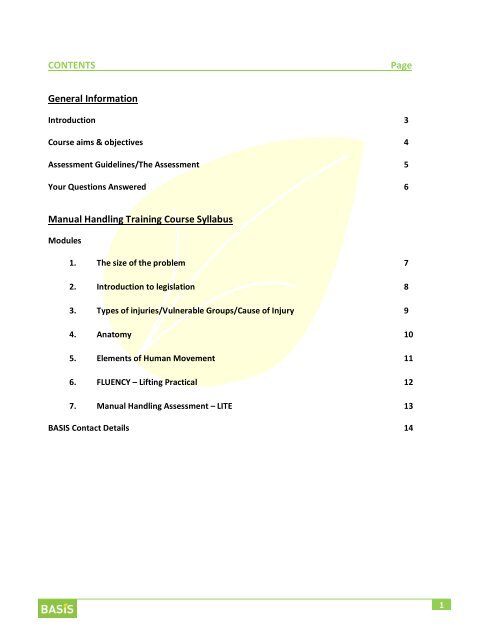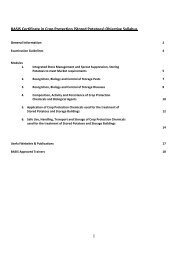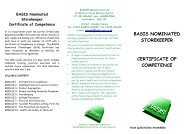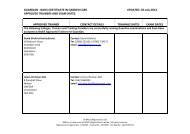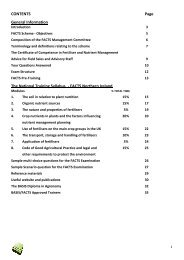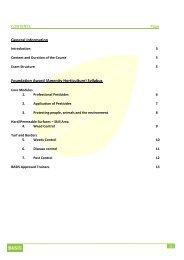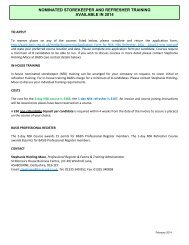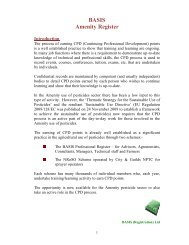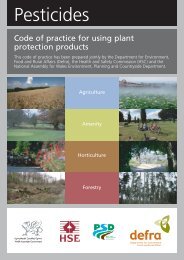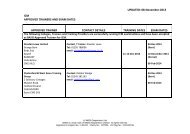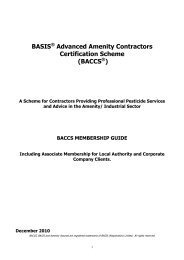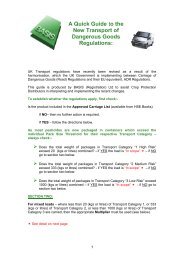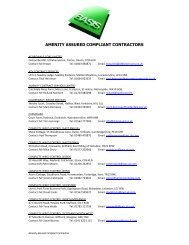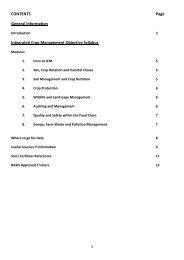MANUAL HANDLING TRAINING COURSE SYLLABUS - Basis
MANUAL HANDLING TRAINING COURSE SYLLABUS - Basis
MANUAL HANDLING TRAINING COURSE SYLLABUS - Basis
You also want an ePaper? Increase the reach of your titles
YUMPU automatically turns print PDFs into web optimized ePapers that Google loves.
CONTENTS<br />
Page<br />
General Information<br />
Introduction 3<br />
Course aims & objectives 4<br />
Assessment Guidelines/The Assessment 5<br />
Your Questions Answered 6<br />
Manual Handling Training Course Syllabus<br />
Modules<br />
1. The size of the problem 7<br />
2. Introduction to legislation 8<br />
3. Types of injuries/Vulnerable Groups/Cause of Injury 9<br />
4. Anatomy 10<br />
5. Elements of Human Movement 11<br />
6. FLUENCY – Lifting Practical 12<br />
7. Manual Handling Assessment – LITE 13<br />
BASIS Contact Details 14<br />
1
2<br />
© BASIS (Registration) Ltd<br />
BASIS is a trade mark of BASIS (Registration) Limited. All rights reserved.<br />
Registered in England No.: 1365343 Charity No.: 1077006 VAT Reg No.: 242/5497/56
INTRODUCTION<br />
It is a requirement under the Health & Safety at Work Act 1974, the Manual Handling Regulations 1992 and<br />
Manual Handling Operations Regulations 1992 to ensure, where Manual Handling in the workplace is<br />
carried out, that we should where possible;<br />
• Avoid Manual Handling.<br />
• Carry out assessment if there is a significant risk.<br />
• Reduce the risk – Training.<br />
Manual Handling operations mean:<br />
Any transport or supporting of a load (including the lifting, putting down, pushing, pulling, carrying or<br />
moving thereof) by hand or bodily force.<br />
Good Health and Safety practices lead to many benefits for the employer:<br />
• Legal Compliance; failure to address manual handling issues in line with the Manual Handling<br />
Operations Regulations 1992 is a criminal offence.<br />
• Social; around 5 million working days are lost each year due to back pain. This is the equivalent<br />
of 20,000 people being off work for a year.<br />
• Moral; workers should be able to return home in at least as good a state of health as they<br />
went to work.<br />
• Publicity; many customers and stake holders take an interest in Health & Safety performance.<br />
• Financial; accidents and injuries cost money – a hot topic for compensation claims.<br />
However, from an employee’s perspective, the main issue is the avoidance of pain and on-going problems –<br />
i.e. maintaining a good quality of life; 80% of the UK population suffer from serious back pain at some point<br />
in their life.<br />
Manual Handling is an important Health & Safety issue within the UK. Handling will always be required, so<br />
training and raising awareness are necessary to reduce the risks associated with this activity. This course is<br />
designed to help companies train their employees in manual handling and help reduce instances of manual<br />
handling injuries within the work place.<br />
The BASIS Manual Handling Training Certificate meets the requirements of today’s legislation.<br />
The training offered by BASIS for this certificate involves a half day training session and includes classroom<br />
training and practical exercises. There will be a multiple choice assessment and a practical assessment of<br />
lifting at the end of the session.<br />
3
<strong>COURSE</strong> AIMS & OBJECTIVES<br />
By the end of the course, participants will;<br />
• Have a basic knowledge of human anatomy.<br />
• Appreciate manual handling legislation and risk assessment.<br />
• Understand the principles of safe manual handling.<br />
• Be able to apply these principles to their own work situations.<br />
4
ASSESSMENT GUIDELINES/THE ASSESSMENT<br />
Assessments are conducted by the BASIS tutors following the running of courses for the BASIS Manual<br />
Handling Certificate at various venues across the UK.<br />
The assessment consists of 20 multi choice questions (relates to 60% of assessment marks) and a practical<br />
assessment (relates to 40% of assessment marks) of which the pass mark for the complete assessment,<br />
overall is 70 %.<br />
The aim of the assessment is to determine whether candidates have understood the basic principles of<br />
Manual Handling as detailed within the BASIS syllabus.<br />
In the event that a candidate’s marks in the assessment fall short of the pass mark by up to 5 marks<br />
(written paper only) he/she will be given the opportunity for an interview viva with the tutor. The purpose<br />
of the viva will be to determine whether the candidate’s mark can be raised to the pass standard. It is<br />
recognised that some candidates can be affected by the assessment process and particularly nervous<br />
candidates may misread questions and therefore give the wrong answer, when in fact they did know the<br />
correct response.<br />
Whistle Blowing Policy<br />
BASIS (Registration) Ltd is committed to the highest standards of openness and accountability. Therefore,<br />
we expect employees, candidates and others who work with BASIS who have serious concerns about any<br />
aspect of our work voice those concerns.<br />
To this effect BASIS has a whistle Blowing Policy. This procedure is designed to allow concerns of a public<br />
interest kind within BASIS to be raised, investigated and where appropriate, acted upon. Complaints may be<br />
any member of staff, candidates or those contracted to provide services to BASIS.<br />
To view the full Whistle Blowing Policy go to:<br />
http://www.basis-reg.co.uk/media/documents/430/index.html<br />
Dyslexia Policy<br />
BASIS (Registration) Ltd allows students diagnosed with Dyslexia to request special examination<br />
arrangements. Proof of dyslexia is required a minimum of 4 weeks before the exam date so that BASIS can<br />
provide special examination arrangements if required.<br />
For a full copy of our Dyslexia Policy please go to:<br />
http://www.basis-reg.co.uk/media/documents/TM%2015%20BASIS%20Dyslexia%20Policy%20-<br />
%20Sept%202011.pdf<br />
5
YOUR QUESTIONS ANSWERED<br />
• How can I obtain the BASIS Certificate in Manual Handling<br />
You can obtain the BASIS Certificate by attending the half day training course and completing the practical<br />
assessment.<br />
• When and where are the courses held<br />
They are held all year round at centres throughout the UK, according to demand. In–House company<br />
courses can be scheduled on request, where there are viable numbers.<br />
• Are the courses practical<br />
The courses are practically based, writing is only required for personal note taking.<br />
• What about the assessment<br />
Your ability to understand and implement good Manual Handling practices will be assessed by the course<br />
tutor and will be based on your success in the practical assessment.<br />
• How do I apply to attend a training course<br />
By completing and returning an application form to the BASIS office. You will be notified when a place is<br />
available for you. Every effort is made to place you on a course in your area, although this is not always<br />
possible.<br />
• Do I have to have practical experience before attending a course<br />
As part of our everyday life we lift items, therefore every candidate will have enough experience to relate<br />
to the subject matter.<br />
6
Module 1 – The Size of the Problem<br />
1.1. Competence<br />
To develop a knowledge and understanding of the effects on the workplace and personal life of poor<br />
Manual Handling practices.<br />
1.2. Performance Criteria<br />
Candidates must be able to;<br />
• Demonstrate a knowledge of the effects that poor Manual Handling practices can have on the<br />
work place.<br />
• Demonstrate a knowledge of the effects that poor Manual Handling practices can have on an<br />
individual’s private life.<br />
• Demonstrate a knowledge of the effects that poor Manual Handling practices can have on the<br />
NHS and the employees private life.<br />
1.3. Essential Knowledge and Skills<br />
• Describe the effects on the work place of poor manual handling practices.<br />
• Describe the effects on the individuals private life of poor manual handling practices.<br />
• Describe the effects on the NHS of poor manual handling practices.<br />
7
Module 2 – Introduction to Legislation<br />
2.1. Competence<br />
To develop a knowledge and understanding of the main areas of Legislation which apply to Manual<br />
Handling Operations within the workplace.<br />
2.2. Performance Criteria<br />
Candidates must be able to;<br />
• Demonstrate a knowledge of the relevant statutory Codes of Practice.<br />
• Demonstrate a knowledge and awareness of the relevant legislation.<br />
• Demonstrate a knowledge of the relevant enforcement authorities for Manual Handling<br />
Operations.<br />
2.3. Essential Knowledge and Skills<br />
• Describe the main aims of the Health & Safety at Work etc Act 1974<br />
• Describe the main aims of the Manual Handling Regulations 1992.<br />
• Describe the main aims of the Manual Handling Operations Regulations 1992.<br />
• Explain how Legislation is enforced and by whom.<br />
8
Module 3 – Types of Injuries/Vulnerable Groups/Cause of Injury<br />
3.1. Competence<br />
To develop a knowledge and understanding of the type of injuries that can occur through poor Manual<br />
Handling practices. To identify vulnerable groups of people and to identify injury causation.<br />
3.2. Performance Criteria<br />
Candidates must be able to;<br />
• Demonstrate a knowledge of the types of injuries that may occur due to poor Manual<br />
Handling practices.<br />
• Demonstrate a knowledge of the vulnerable groups that are at risk of Manual Handling<br />
Injuries.<br />
• Demonstrate a knowledge of the cause of injuries that may occur due to poor Manual<br />
Handling practices.<br />
3.3. Essential Knowledge and Skills<br />
• Describe the main types of injuries that may occur due to poor Manual Handling procedures.<br />
• Describe the vulnerable groups and give reasons to why they may have a higher risk of Manual<br />
Handling Injuries.<br />
• Describe the main causes of Manual Handling injuries within the workplace.<br />
• Describe the benefits of a good Manual Handling culture within the work place.<br />
9
Module 4 – Anatomy<br />
4.1. Competence<br />
To develop a knowledge and understanding of the Human Anatomy in relation to Manual Handling<br />
Operations.<br />
4.2. Performance Criteria<br />
Candidates must be able to;<br />
• Demonstrate a knowledge of the spine (skeletal structure).<br />
• Demonstrate a knowledge of spinal discs and their function within the human back.<br />
• Demonstrate a knowledge of the spinal cord and its importance.<br />
4.3. Essential Knowledge and Skills<br />
• Describe the main function of the human spine.<br />
• Describe the makeup of the human spine.<br />
• Describe the different sections of the spine.<br />
• Describe the function of the discs within the human back.<br />
• Describe the function of the spinal cord.<br />
10
Module 5 – Element of Human Movement<br />
5.1. Competence<br />
To develop a knowledge and understanding of the elements of human movement in relation to Manual<br />
Handling Operations within the workplace.<br />
5.2. Performance Criteria<br />
Candidates must be able to;<br />
• Demonstrate a knowledge of the range of movement required during Manual Handling<br />
Operations.<br />
• Demonstrate a knowledge and awareness of the body’s centre of gravity.<br />
• Demonstrate a knowledge of how weight and compensatory tension act on the spine during<br />
lifting.<br />
• Demonstrate a knowledge of the HSE guidance on weights to be lifted by either male or<br />
female workers.<br />
• Demonstrate a knowledge of team lifting and communication.<br />
5.3. Essential Knowledge and Skills<br />
• Describe the main muscle areas used for a range of Manual Handling Operations.<br />
• Describe the conditions required with regard to the human body for safe Manual Handling<br />
Operations.<br />
• Describe the effects that the weight lifting guidance may have on the work place.<br />
• Describe the essential elements required for safe team lifting.<br />
11
Module 6 – FLUENCY – Lifting Practical<br />
6.1. Competence<br />
To develop a knowledge and understanding of the mnemonic FLUENCY and to implement FLUENCY into a<br />
good Manual Handling Lifting technique.<br />
6.2. Performance criteria<br />
Candidates must be able to;<br />
• Demonstrate knowledge of a good lifting technique.<br />
• Demonstrate knowledge of FLUENCY.<br />
• Demonstrate good lifting technique in practice.<br />
6.3. Essential Knowledge and Skills<br />
• Describe the principles of a good lifting technique.<br />
• Describe the main principles of FLUENCY.<br />
• Carry out a Manual Handling Practical using a good lifting technique and using FLUENCY.<br />
12
Module 7 – Element of Human Movement<br />
7.1. Competence<br />
To develop a knowledge and understanding of how to carry out a Manual Handling Assessment using the<br />
mnemonic LITE.<br />
7.2. Performance Criteria<br />
Candidates must be able to;<br />
• Demonstrate knowledge of the need for Manual Handling Assessment.<br />
• Demonstrate knowledge of when to carry out a Manual Handling Assessment.<br />
• Demonstrate knowledge of who should carry out a Manual Handling Assessment.<br />
• Demonstrate knowledge and understanding of LITE and how this forms part of the Manual<br />
Handling Assessment.<br />
• Demonstrate knowledge of how a Manual Handling Assessment may affect the work place.<br />
7.3. Essential Knowledge and Skills<br />
• Describe the main aims of a Manual Handling Assessment.<br />
• Describe when a Manual Handling Assessment is required.<br />
• Describe LITE as part of a Manual Handling Assessment.<br />
• Describe the effects on the work place of a Manual Handling Assessment.<br />
• Describe the benefits in the workplace of a Manual Handling Assessment.<br />
13
BASIS CONTACT DETAILS<br />
BASIS ® (Registration) Ltd<br />
St Monica’s House Business Centre<br />
(37-39) Windmill Lane<br />
Ashbourne<br />
Derbyshire<br />
DE6 1EY<br />
Contact: Stephanie Hickling-Mace<br />
Tel: 01335 340858<br />
Fax 01335 301205<br />
E-mail: stephanie@basis-reg.co.uk<br />
Web: www.basis-reg.co.uk<br />
BASIS is an independent, self-regulatory registration, standards and certification scheme serving the<br />
pesticide, fertiliser and allied organisations and interests. It works with Government to set high standards<br />
and check that they are being met. It was one of the world’s first standard setters for pesticide suppliers<br />
and has also been called upon to assist in establishing similar systems in other parts of the world.<br />
Other activities of BASIS include the annual assessment of pesticide supply stores under the Code of<br />
Practice for The Food & Environment Protection Act 1985 and Control of Pesticides Regulations 1986,<br />
including the examination of training courses for industry staff and administration of Statutory Certificates<br />
of Competence.<br />
July 2013<br />
14


